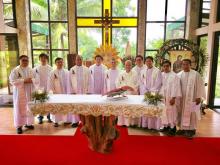CELIBACY & HUMAN INTEGRATION:
A Healthy Way of Living, Loving and Serving as Chaste Celibates
RCJ On-going Formation Program
October 10-15, 2016
Oasis of Prayer
By: Fr. Viktor Emmanuel Aurellana, RCJ
First Day
Celibacy and Human Integration
Facilitator: Msgr. Ramon Masculino
Msgr. Nonoy invited the participants to be open to the wonderful possibilities of a healthy way of living, loving and serving as chaste celibates.
As priests are engaged in the ministry of caring, they must also care for themselves so as to take care of others BETTER. In other words, caring for the pastor can make them better pastors.
Aside from the four pillars of Priestly Formation (human, spiritual, intellectual, pastoral), the speaker added the element of communion as promoted by Pope Emeritus Benedict XVI and Pope Francis.
The capacity to relate well with others is an important measure of affective maturity. Indicators of affective maturity are: self-awareness, self-regulation, social awareness and social skills.
Msgr. Nonoy threw some big questions about affective maturity and the importance of motives behind embracing the life of chaste celibacy.
Chaste celibacy is a difficult Church tradition and discipline. But it is first and foremost a gift. For if not for the grace of God, it would be most difficult to persevere in the service of priesthood.
The afternoon session yesterday centered on a proposal for a working definition of celibacy. Msgr. Nonoy insisted on the idea that Celibacy is a dynamic state that is freely chosen. Thus, affective maturity is very important to be truly free and responsible as a person consecrated to God, and is ready to live in this dynamic state of celibacy.
The speaker, using A. W. Richard Sipe's definition, explained that celibacy is "an honest and sustained attempt to live without direct sexual gratification in order to serve others productively for a spiritual motive." In addition to freedom and dynamism, the definition highlights the public nature of celibacy, honesty, equilibrium of needs and demands, sublimation of desires, social value of commitment, single-heartedness, grace and prayer.
Msgr. Nono presented also the stages of celibacy, namely, adolescent, generative, intimate and integral. Each stage has its own issues and goals to be achieved. The speaker pointed out that celibate intimacy is possible only when persons are emotionally mature.
Perhaps, another challenging point to priests and formators is the awareness of forming candidates to a life of celibacy. Formators must be conscious in helping the young clarify their understanding of celibacy, their motives behind choosing celibacy, skills necessary to live and navigate thru the issues connected to it, as well as to clarify distorted concepts of celibacy.
One important thought about celibacy is that it is best practiced when it is lived in communion with others, according to the teachings of Pope Emeritus Benedict XVI and Pope Francis.
Eucharistic Celebration (Memorial of Our Lady of Pillar)
Presider: Fr Alex B. Clemente
Preacher: Fr Carlos Guzman
"To be successful, priests need a woman in their ministry... and we are blessed to have the Blessed Virgin Mary, a woman, a model disciple and a mother who will be there even at the loneliest and weakest point in our life." [Fr Carlos Guzman]
Day Two
Emotional Quotient
Facilitator: Mrs. Lourdes Migne
Priests are leaders. Warren Bennis wrote: "Leaders know the importance of having someone in their lives who (can) unfailing and fearlessly tell them the truth." This is possible when leaders and community members can practice well their Emotional Quotient skills.
Positive emotions broaden choices and build more options. The practice of EQ makes the difference between a good and a great community. A good community delivers expected results. But a great community delivers results beyond expectations, and is able to sustain their performance (Jim Collins).
Mrs. Louie Migne, our resource speaker, facilitated this seminar-workshop on EQ. One's EQ can be measured in terms of self-awareness, self-regulation, motivation, empathy and social skills. These components are akin to muscles that must be exercised, motives are constantly clarified and evaluated thru feedbacks. The vitamins that keep the muscles firm are humility, sincerity of desire and concerted effort.
An active EQ promotes a proactive approach to the conflicts that may arise in any relationship. It provides an alternative to the "fight or flight" approach to problematic relationships. It replaces negative attitudes that are toxic to community life. It may help reduce high level conflicts that often deteriorate the health of persons.
The practice of EQ does not only produce good relationships in the community, but it is also the secret to a good and happy life.
With all these benefits, the speaker challenged the participants to take accountability in the practice of their resolutions by having an EQ Buddy who will serve as a friend, guide and conscience in this journey of growth and transformation.
An image of St. Teresa of Calcutta was given to the speaker as a token of gratitude and a recognition of her availability to share her expertise.
The participants were asked to rate the importance of EQ from 1-10 at the end of the seminar. To their surprise, the speaker rated it as a ZERO because it's value can only be measured when it is implemented and has made a significant impact in the life of their respective communities. Sya nawa! (Amen!)
Eucharistic Celebration
Presider: Fr. Viktor Emmanuel Aurellana
Preacher: Fr. Francis Paul Escaño
"We priests and religious must avoid presuming that we know everything all the time especially in dealing with people. Instead, let us always be aware of the context where we are, since our ideas, knowledge and other concerns are coming from where we work, with whom we work and live. It is this context, which is greater than us, that should make us avoid presuming and to be more open to the presence of others."
Day Three
Rogationists at the 12th General Chapter: Rogationist Charismatic Identity
Facilitator: Fr. Jessie Martirizar
Fr. Jessie Martirizar, former General Councilor, shared his post capitular reflection regarding the theme.
Identity is not only about going back to the foundation but it can also be understood as a construction or an on-going process that is never completed for as long as individuals continue their journey in life. Thus, to deal with one's charismatic identity is to re-affirm and re-visit the foundations of the institute while looking at the relevance of this identity in the Church and in the world at the present.
Fr. Jessie said that this charismatic identity must be responsive to the needs and challenges of the present in accordance with its socio-cultural context. The speaker noted that the congregation is still growing today and expanding its presence all over the world. However, in this expansion of presence, the fidelity to the identity is a burden particularly on the shoulders of those in charge of the missions as well as those in charge of seminary formation.
The inculturation of the charismatic identity demands (1) the identification of the sources for this identity, (2) the model of identity and (3) the manner by which this identity is communicated.
For us Rogationists, Fr. Jessie readily identified the Heart of Jesus as the source of the Rogate and the Rogationist identity. Thus, the finality of Rogationist formation is to be configured or conformed to Jesus Christ, specifically, to assimilate His sentiments and to prolong his compassionate presence in the Church today. In other words, Rogationists must constantly strive to "look, feel, pray, speak and act as Jesus did." The Word of God is the constant guide to remain faithful to this identity.
Secondly, the model of this charismatic identity is no other than St. Hannibal Mary Di Francia, the exemplar paradigm of the Rogationist Congregation. To properly interpret the Rogationist charismatic identity, one must consider these binary encounters that defined Fr Hannibal's life-mission: encounter with Jesus in the Blessed Sacrament and encounter with the poor in the person of Zancone. In the contemplative dimension of His formation to the Rogate charism, the young Hannibal was drawn to pray for good and holy workers at the service of the Church, not because priests were lacking, but he saw that many priests are weak in terms of responding to the needs of the Church and of the poor. At the same time, good and holy priests attract people, and is the best way to promote vocations. Conformity to Christ is truly indispensable. As Jesus said, when I am lifted up from the earth, I will draw all people to myself (John 12:32). These binary encounters or meetings must be the same path that every Rogationist must take.
Thirdly, Fr. Jessie said that the manner of communicating this charismatic identity should be concrete. It must be manifested in a life style that is peculiarly Rogationist. The speaker cited from the Ratio Institutionis of the Rogationist Congregation the characteristics of a Rogationist way of life that should serve as a checklist for the participants to evaluate themselves.
Fr. Jessie also pointed out the importance of promoting the laity as partners in the Rogate mission. Also, he affirmed the importance of social media in order to make the Rogationist identity visible to as many people as possible. However, he challenged the participants to be more conscious of how these media particularly the use of Facebook is being utilized for that purpose. Although many may not be aware of how these media affect our identity, Fr Jessie hoped that we won't miss our fundamental goal as a Rogationist, that is, to be conformed to Christ from whose Sacred Heart, the Rogate was born.
Gratitude, comments and questions were made by the participants to the speaker. Despite the huge task of responding to the challenges of Rogationist charismatic identity, the participants were encouraged by Fr Jessie to simply work with one thing at a time, as well as to have an open attitude, to be available to the greater demands of the Congregation which might be more burdensome, but it can also broaden horizons to see more this vast crowd in need of a shepherd, in need of Christ.
Spiritual Recollection
Facilitator: Fr. Joselin Gonda
Priests are formed to live and think like a priest right from the start of their basic formation. As a consequence, there are some needs that are not properly addressed as they pass thru the stages of development like any ordinary person. Such issues are bound to come back especially when the priest begins to enjoy his personal freedom apart from the structures of basic seminary discipline.
Fr. Jojo, our recollection speaker, thus explained that dealing with these unaddressed issues is a long tedious process. Priests should be open to the processes of change even to the experiences of failures that can happen to anyone no matter how diligent or prayerful they are. He said that no one can say that he will be safe from trials and difficulties.
To persevere in these struggles, the speaker presented five elements that are essential for a joyful and meaningful Priestly life:
- There has to be a clear cut, honest to goodness relationship with God (connection, oneness with God). There must be regular commitment to one's prayer life.
- There has to be a quality community life of priests; priests should have genuine friends among brother-priests; (Consequently, there must be a commitment to avoid destroying one another, as well as, relating superficially to each other).
- Priests must attend On going Formation. it is not only updating, but should be an avenue for personal development in every aspect of human life (healthy lifestyle in mind and body) and holiness; It is also a development in pastoral life. When priests take care of themselves, they take care of the Church.
- Priests should live a life of discipline. Those who who left the priesthood often times lived undisciplined lives; no personal discipline. Undisciplined priests easily get sick. Priests should make the right choices, have enough time to rest, choose the things they need to do. They should set for themselves an inner structure to order their lives. Disciplined priests live happier and find more meaning in their life.
- Priests should find happiness in their ministry and in their life as a priest/religious. Their motivation to do mission must only be to serve with joy. They should strive to avoid serving with vested interests (for money or prestige). Priests should find joy in bringing people to church. Priests must have a love for service as Jesus did.
In conclusion, the speaker advised the participants to take care of themselves: their body, mind, heart (emotions), soul. Priests should avoid any form of addiction (alcohol, television, money, movies, etc because the focus of any addiction is the self, instead of focusing on God and on service.
The speaker reiterated that priests must take care of their priesthood. They should OWN it so as to be responsible to it. Make the best out of it. The priesthood has to be the most essential part of one's life and should not be considered as something externally or secondarily added to the person.
Fourth Day
Healthy Living: Well being of Priests
Facilitator: Dra Edna Lao
Stress is part of the life of a priest. Dra Edna explained that stress is important. It is the human body's way of making us more alert and ready to take up the challenge. But we need to deal with it the right way.
We can either react or respond to stress. When we react to stress, we either fight or take flight but in an instinctive way. On the other hand, when we respond to stress, we think about our options and actions, thereby developing the ability to handle stressful situations.
Dra. Edna said that a lot of diseases are effects of reactions to the stress in life. Reacting to stress affects bodily organs and processes which eventually increases stress hormones. This results to adrenal fatigue jeopardizing the well being of the person.
The speaker suggests that a solution to stress is to stay relaxed and active. She advised that stressed priest should ask for help, be humorous and sleep at least 7 hours a day. Moderation in everything is the key to a healthier way of living according to Dr. Edna.
The heart is usually considered as the most important organ. But the speaker said that in the work of detoxification of the body, it is the liver that is most valuable.
So much information has been shared by Dr. Edna. One important principle she said is that in solving a problem, we must address the root of the problem. The sources of stress might be difficult to avoid. But we hold on to the good news that we have the power to respond intelligently.
Eucharistic Celebration
Presider: Fr Orville R. Cajigal
Preacher: Fr Herman Abcede
Fr. Herman exhorted the participants to "be not afraid" of accomplishing the resolutions made in this updating course. In times of struggles, he advised us to remember the marvels of God. He urged us to communicate with one another regularly, and to pray for one another earnestly. He also invited us to be open to the surprises of God.
The prayer after communion was followed by the recitation of individually composed prayers by each participant. Afterwards, Fr Orville read the group's commitment statement and formally introduced the name chosen for our batch: M.U.S.C.L.E.S. (Men United to Support, Challenge, Listen and Empower for Sanctity)












